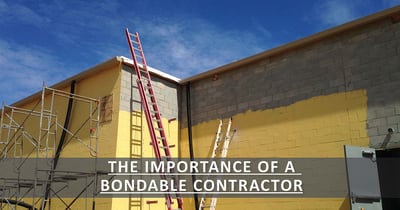
Protecting Yourself during Construction
Your project may not be costly enough to need a bond; however it’s still a good idea to ask your contractor if they are bondable because the question becomes a very effective prequalification tool. According to Mike Lechner, our bonding agent at Guy Hurley Blaser & Heuer, “bonding capacity is an indicator of a contractor’s character, experience and financial viability underwritten by a professional third party”.
I know it can be very tempting to throw caution to the wind and find a cheap contractor that's neither bondable nor insured. What could possibly go wrong, anyway? Well let me tell you, ignoring these characteristics is very risky behavior when you’re talking about spending a considerable amount of money on your building. I’ll provide for you three key reasons why it’s considered high risk:
1. If a contractor isn’t bondable or their bonding capacity is small (i.e. $250,000 or less) it can tell you a lot about problems that they’ve had in the past either with completing their work, paying bills or taxes, or being stretched too thin. If you’re working with a contractor that you’re unfamiliar with, I’m sure that you would like to know that they aren’t going to abandon you in the middle of your project. A surety company investigates, reviews the appropriate information, and takes the information into consideration before bonding a contractor.
2. When your contractor isn’t bondable, your financial investment is at risk if they don’t complete their work. On very large projects, a contractor is typically bonded to ensure that if they can’t finish the project, the bonding company pays to finish it. That way, the building owner isn’t out millions of dollars to finish construction and they won’t have to pay twice for subs and suppliers in the event the contractor defaults. See “Lien Risks with Construction Sub-Contractors” for more information.
3. An unbondable contractor typically lacks organization or professionalism to efficiently complete your project. The fact that a contractor takes the steps to be bondable, means that they value their clients and want to protect the client’s interests, also indicating better than average customer service.
Regardless of the size of a project, we get many inquiries for background information from potential clients and two of our favorite questions are “who is our bonding company?” and “what is our bonding capacity?” These questions make the list of favorites because we know that it means the client wants to work with a professional contractor that will minimize their risk. That type of client is a perfect fit for us.

